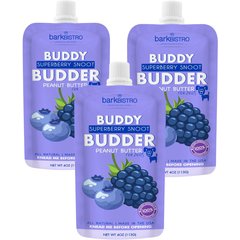Can Dogs Eat Blackberries?
Adobe Stock/Studio13lights/Adobe Stock
NOTE: Always check with your veterinarian before giving your dog any new foods, especially “people foods.” What might be OK for one dog might not be good for your dog, depending on multiple factors such as their age, health history, health conditions, and diet. Dogs on prescription diets should not be fed any food or treats outside the diet unless your veterinarian tells you it’s fine to do so.
Blackberries are a popular superfood for humans, but can dogs eat blackberries? Yes, they can—and they offer some health benefits too. However, as with any treat, it's important to give them in moderation to avoid nutritional imbalances and any potential stomach upset.
Here’s everything you need to know about the benefits and drawbacks of blackberries for dogs—and how to figure out how many you can safely give your pup.
Are Blackberries Good for Dogs?
Blackberries are relatively low in calories and lower in sugar than many other fruits. They also have plenty of vitamins and other nutrients that can provide certain health benefits to dogs. But because blackberries are fed in such small amounts to dogs, they won’t provide much nutritional value. Instead, view them as treats to give your dog on occasion.
That said, here are some vitamins and other nutrients found in blackberries and their possible health benefits:
-
Anthocyanins/antioxidants reduce inflammation and may protect against diseases like heart disease, type 2 diabetes, and cancer.
-
Fiber helps with gastrointestinal functioning by improving gut health and helping stools flow properly.
-
Omega-3 fatty acids help reduce inflammation; promote heart and kidney health, and skin and coat health; and support immunity and brain development.
-
Vitamin A supports eye and skin health, boosts immunity, and helps with bone growth and reproduction.
-
B Vitamins boost immunity, metabolism, energy, and brain and heart health; and promote skin and coat health.
-
Vitamin C helps boost the immune system and aids in the healing of wounds. It also plays a role in the formation of collagen; the absorption of iron; and the maintenance of bones, teeth, and cartilage.
-
Vitamin E is an antioxidant that promotes healthy circulatory and immune systems, as well as healthy skin and muscle development.
-
Vitamin K promotes bone, heart, blood, and muscle health.
Are Blackberries Bad for Dogs?
Blackberries aren’t inherently bad for dogs. But still, moderation is key when feeding your dog any treats.
Although blackberries are very healthy and the sugar content is lower than other fruits, too many blackberries can still upset your dog’s stomach. This could be from the sugar content, the high fiber content, or because of food intolerances in your dog.
Also, feeding too much of any single type of food can lead to nutritional imbalances.
Contact your veterinarian if you notice any of the following symptoms:
-
Upset stomach
-
Abdominal pain
Lots of blackberries can also cause strange-colored stool, mostly blue or black, which can be mistaken for blood.
How Many Blackberries Can Dogs Eat?
Blackberries should be treated as, well, a treat. All treats combined should only make up 10% of your dog’s diet, while the other 90% should come from a complete and well-balanced dog food. This will help ensure that your dog gets all the proper nutrients they need and that they don’t overdo it on sugar, fats, or calories from treats.
Here are some general guidelines for feeding blackberries as a treat to your dog:
| Dog Size | Serving Size |
|---|---|
| Extra-small dogs (2–10 pounds) | 1 blackberry |
| Small dogs (11–20 pounds) | 2 blackberries |
| Medium dogs (21–50 pounds) | 2–5 blackberries |
| Large dogs (51–90 pounds) | 5–6 blackberries |
| Extra-large dogs (91+ pounds) | 7–8 blackberries |
Contact your veterinarian if:
-
Your dog ate a lot more than the amounts above
-
You’re not sure how many they ate
-
They’re showing signs of stomach upset, like vomiting, diarrhea, abdominal pain, or a poor appetite
How To Safely Feed Blackberries to Dogs
Ask your vet before giving your dog blackberries on a regular basis. If they give you the OK, here are some tips for safely prepping the berries and incorporating them in your dog’s diet:
-
Wash the blackberries thoroughly.
-
Remove any stems, which are hard to digest and can be a choking hazard.
-
Cut the blackberries into small pieces, or mash or puree them.
Once the blackberries are prepped, here are some serving ideas:
-
Give cut-up blackberries to your dog as small treats.
-
Add mashed blackberries on top of your dog’s food.
-
Mixed mashed blackberries with a small amount of plain Greek yogurt and spread onto a lick mat. Don’t serve this to dogs who are lactose-intolerant.
Recommended Products
Can Dogs Eat Blackberries FAQs
Can dogs eat wild blackberries or hybrids like loganberries?
Yes, dogs can eat wild blackberries and hybrids. Blackberry hybrids, such as loganberries, are also safe for most dogs to eat; so are the wild blackberries that grow in your backyard—as long as you are certain which fruit they are, and they are free of pesticides and other chemicals.
Can dogs eat blackberry jam or jelly?
No, dogs should not eat blackberry jam or jelly. Although blackberries are healthy for dogs, jams and jellies have a very high sugar content. Anytime your dog consumes foods with large amounts of sugar, it can cause health problems. However, if your dog accidentally does eat a small amount of blackberry jelly, they should be fine.
Just make sure the jam or jelly does not contain any xylitol, because xylitol is toxic for dogs.
Which berries are toxic to dogs?
Holly berries, poke berries (pokeweed), juniper berries, and mistletoe berries are toxic to dogs. And don’t give your dog wild berries unless you can identify the berries with absolute certainty.


